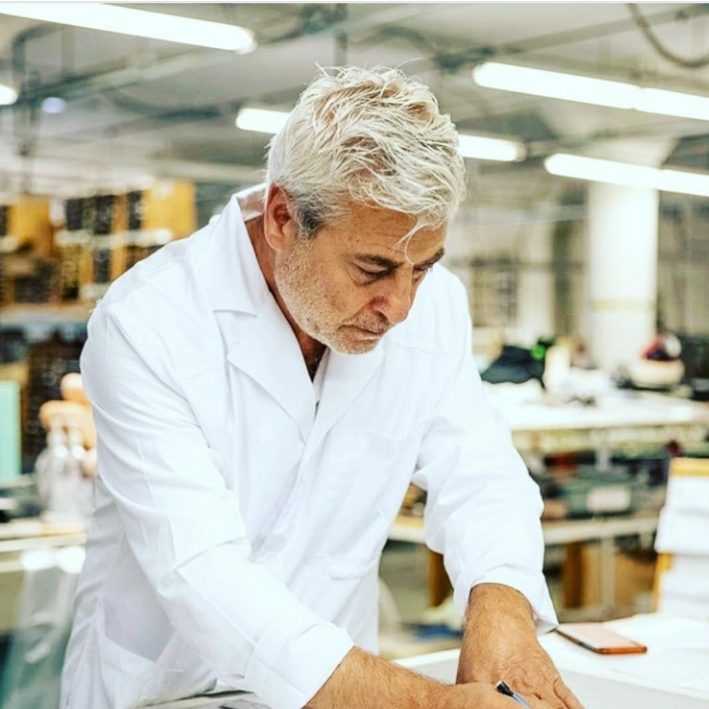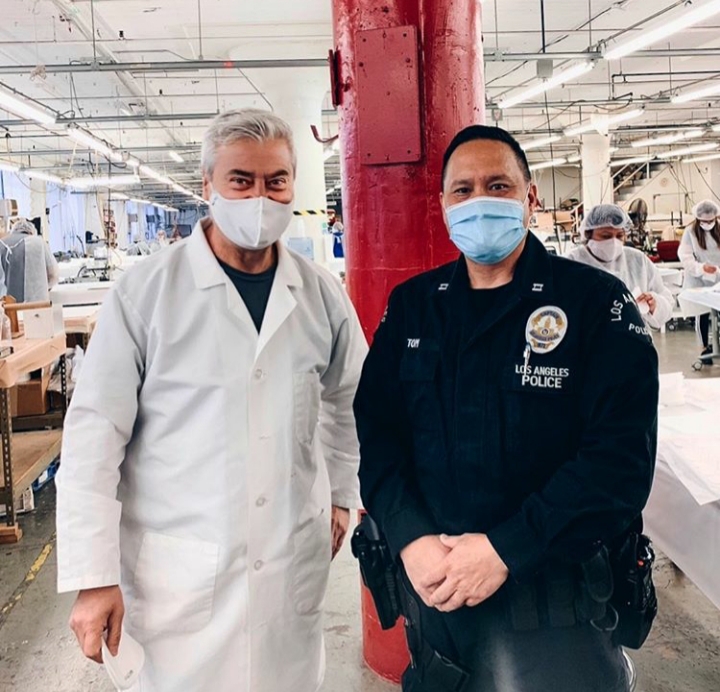Louis Vuitton manufacturer shifts production of luxe leather goods to supply medical grade N95 masks and protective gowns

“If there wasn’t any COVID-19 happening,” mused Alexander Zar, “we were fully booked for the production of the Louis Vuitton. We were making 7,000 units for them, and would have been starting our fall season production. We had three other companies launching products, and we were dropping a couple thousand pairs of shoes every month. We were golden. The economy was good, and we had at least fifteen customers in line to get into our capacity somehow or other.”
On the Thursday afternoon before Easter, Zar’s La La Land Production & Design is still bustling with activity, albeit not with couture handbags and high-end shoes. For the past few weeks, workers at the factory have been manufacturing hand-stitched N95 medical-grade masks to service hospitals, clinics, law enforcement, and security companies to help services the shortage in personal protective equipment (PPE). With lack of support from the White House, and state and local governments slow to meet demand, the shortage on PPE is creating dire circumstances for healthcare workers around the country, and impeding their ability to slow the rate on the transmission of the novel coronavirus.
Before last month, La La Land was the only and largest North American subcontractor for LVMH, the world’s largest luxury brand conglomerate. Currently, it is one of the leading local producers of PPE. From his third-floor headquarters on East 7th Street, Zar, with the help of his sister and Lalaland production manager, Kobra Zarafshan, leads nearly one hundred of the factory’s workers, clad in protective surgical garb, in the production and distribution of approximately 10,000 masks per day.

Zar has contracted with two other facilities to make the gowns, with 200 employees creating 25,000 units daily. He’s also rolling out designs for isolation suits and face shields, and, any day now, with an automated machine he recently purchased from overseas, his crew will be able to churn out 350,000 masks per day. “I never thought I’d be doing this kind of stuff,” Zar said. “But hey, if this is what we have to do to help, to make a living and to employ our people, that’s what I’m going to do.”
The spread of the coronavirus has been on Zar’s radar since the pandemic hit China late last year. As the virus locked down much of the country by mid-January, it also shut down production on components that Zar imports from the region “because unfortunately,” he said, “everything depends on another country to import. We shifted our production of the components to Indonesia and to Mexico. So, we rode that problem.”
Within days, new cases were being confirmed around the world: India, Philippines, Sweden, Spain, Russia, Australia, Canada, Japan, Singapore, Germany, the UK, Vietnam, and parts of Africa. Cases in Washington state and New York were also being reported. By mid-February, increasing fatalities in Italy prompted local authorities in Venice to shut down Carnival, suspending sporting events and closing supply factories that Zar depends on for all his leather goods.
“We had to run around and figure out how we were going to manage that,” said Zar. He found what he needed in Brazil and other places around the world. “But I knew the United States was going to be in the same situation the rest of the world was facing. So, I started gearing up to study how to make masks.”
Spurred by the encouragement of his wife, Maryam Zar J.D., Chair of the Westside Regional Alliance of Councils and a Commissioner on the Los Angeles Commission on the Status of Women, Zar sourced 280,000 yards of polypropylene – the textile used in making single use medical mask and gowns — from a nearby supplier with product left over from the 2003 SARS epidemic in China. “He was stuck with all of this material from that period, all medical grade. A lot of people went into the business [of designing PPE products], but then went bankrupt when the SARS did not spread further. So, I purchased all of his inventory, and got myself ready for this thing that was coming.”
La La Land was still in full luxe brand-making mode in mid-March. “Then the big ball dropped that the U.S. and Los Angeles is locking down, and I had to change my gear,” said Zar who is currently servicing California, Colorado, and, just this week, New York, with a request for six million gowns. Zar is also mobilizing efforts to produce protective materials for Bangladesh, Pakistan, China and India in an effort to diversify the supply chain that was interrupted in China. “When chaos happens, I can live through it,” he says matter-of-factly. “I can find a solution and I can thrive in it.”
Zar is used to adapting quickly. The 60-year-old Iranian-born entrepreneur and father of three was 19 when he hitchhiked from Tehran during the 1979 Iranian Revolution and landed in Italy where first fell in love with fashion. While working his way through college, he received a scholarship from the state of Massachusetts to studying engineering and he moved to Boston to attend Northeastern University.
It was in Boston, in 1987, that he started his first business in multimedia and animation. He sold the company in 1989, and moved to Prague just months after the fall of the Berlin wall. He worked a couple of years acquiring and managing different companies in the Czech Republic while starting an MBA program in Eastern Europe. He returned to the States to finish his degree at the Katz Graduate School of Management at the University of Pittsburgh.
Afterwards he worked as an international consultant to all of the major American oil and gas companies for the Central Asian Republics — he lost much of that market following an executive order by President Bill Clinton not to develop in the region — Zar moved to New York City to pursue his passion for haute couture. He began designing and manufacturing his own line of luxury shoes and handbags domestically, along with a chain of retail stores. “And then when it got too cold, we moved to California,” he said with a laugh. He started Lalaland in 2001, six months prior to the World Trade Center attacks.
Even as manufacturing increasingly moved to China, Zar decided to stick it out in the luxury market locally. “I stayed in the luxury market because I was not competing for price,” he said. “I was successful to be the only U.S. luxury manufacturer of shoes and handbags, and that’s helped me to stay in this business and not be effected by the competition globally. We always competed with Germany, Italy and France, not China, or India or Bangladesh.”
Just before the sun rose over Southern California on Saturday morning, Alex and Maryam Zar had already been working for several hours, bombarded with requests for new PPE orders. It was just around 11 when Zar and I spoke again, and he conceded that he’s been operating on four hours of sleep a day since the pandemic hit, working in the factory from 6 a.m. until 9 p.m., then online at home with overseas suppliers in Italy and China. Features on KCRW, KPCC and a public mention by Mayor Eric Garcetti during a recent press briefing have increased the inquiries for Zar’s medical products. Before this call, he was finishing up another with a company looking to contract a million masks to service medical facilities in Minnesota.
“I have to figure out how I’m going to source the material globally for them,” he said, “It is so crazy. I would never have imagined there would be such a lack of supply in this country.”Zar expects the demand to continue to soar over the next five months but, despite forecasts of a pandemic-induced economic recession globally, Zar plans to resume his work in luxury goods once the worst of virus crisis subsides.
In the meantime, he has decided to create a permanent subdivision of his business dedicated to medical goods. “I’m now in the process of getting FDA approval for several of my designs for masks I am producing,” he said, “and I am working with scientists here to be able to create materials made from nano-technology microfiber to create a very needed and strategic product, so that after this chaos goes away we will not be dependent on other countries to provide us with everything we need for our healthcare system.
“My goal always has been, and it is still, to localize and customize, and automate and be able to produce domestically so we are better able to compete globally.”
Top photo: La La Land mobilizing in downtown Los Angeles to meet the nation’s demand for PPE making 25,000 units per day, increasing to 50,000 units per day, and globally importing raw materials. Photo by Jesus Diaz for La La Land PPE.
All photos courtesy of La La Land Productions & Design.